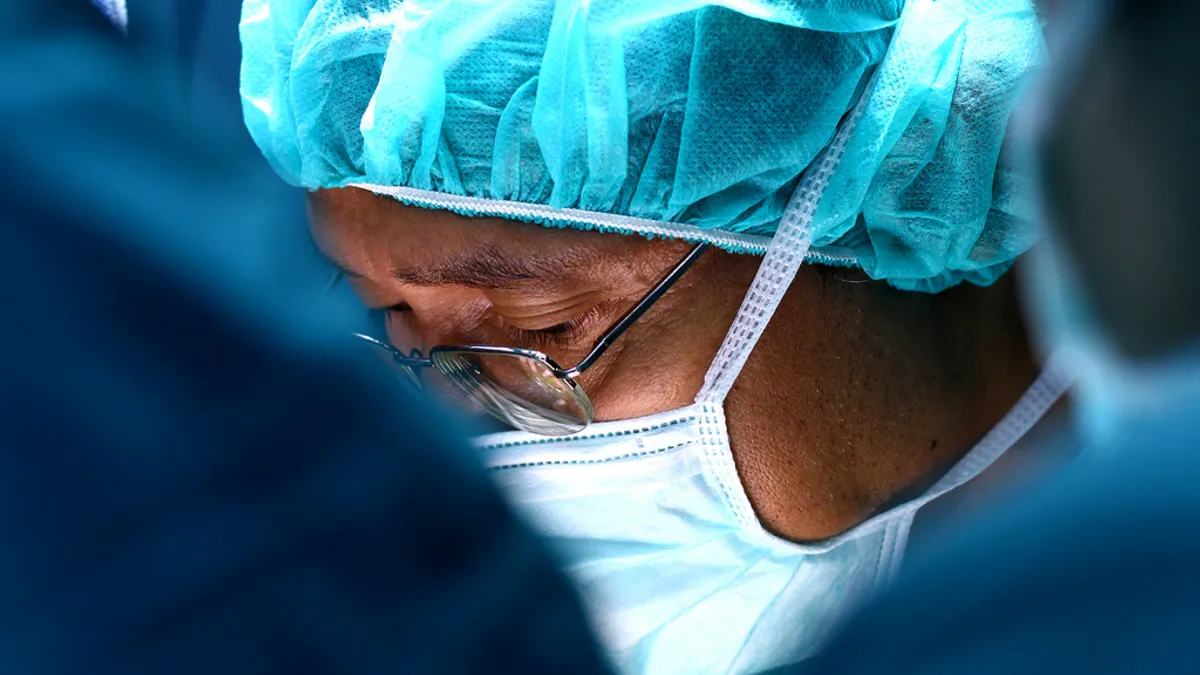Dive Brief:
- Heart valve maker Edwards Lifesciences reported a 10% rise in net sales to $906.6 million in the third quarter. Adjusted earnings rose 27% to $1.07 per share.
- Edwards said 11% growth in underlying sales, which exclude currency fluctuations and other one-time factors, was in line with the company's expectations.
- Sales of transcatheter aortic valves that are implanted without open heart surgery rose 16% to $558 million, even as the company’s market share outside of the United States declined slightly and royalty revenue fell, Edwards said.
Dive Insight:
Sales of the less-invasive transcatheter aortic valve replacement (TAVR) devices have slowed this year, and some analysts think the reason could reflect caution among surgeons toward use of the valves in younger patients.
Transcatheter valves, which are implanted using a catheter threaded through the arteries to the heart, have enjoyed great success as an alternative to surgery in patients at a high risk for the traditional open heart procedure, who tend to be older. Success rates in these patients have fueled strong sales of the devices for both Edwards and competitor Medtronic.
On Edwards' third-quarter conference call with analysts, CEO Michael Mussallem said the company expects to gain FDA approval for its next-generation Sapien 3 Ultra system around the end of the year, and the device remains on track for a CE mark in Europe in the fourth quarter. Mussallem said the company has decided on a "controlled rollout" for the Ultra valve that includes surgeon training to ensure procedural success.
Mussallem also addressed news that a German court has granted Boston Scientific’s request for a preliminary injunction on Edwards' future commercial sales of Ultra in that country, saying Edwards "will promptly appeal" the decision. Mussallem said the decision does not impact sales of its new Sapien 3 Centera valves or its clinical study of Ultra in Europe.
The German court determined that Edwards' Sapien 3 Ultra device infringed a patient established by Boston Scientific subsidiary Symetis involving the fabric used on the valve seal. Boston Scientific, in a press release, said it has not yet exercised its option to enjoin Edwards’ device from the German market.
Edwards gained FDA approval in 2016 for use of its Sapien 3 TAVR devices in patients determined to be at intermediate risk for surgical valve replacement, and Medtronic followed suit last year with FDA approval of its CoreValve TAVR system for this group. Edwards earlier this month announced the start of a pivotal clinical trial for its self-expanding Centera transcatheter valve for patients at intermediate-risk for open heart surgery. The company is currently implementing a targeted commercial introduction of the Centera device in Europe.
Edwards and Medtronic are also focused on expanding use of TAVR to lower-risk patients, with both companies expected to release clinical trial data for this patient population at a medical meeting in March 2019. Edwards said it expects to receive approval for a low-risk indication for TAVR later in 2019.
Mussallem also announced on the call that FDA approved the start of its Pascal pivotal trial to study mitral valve repair in patients with primary mitral regurgitation. Edwards expects to launch that product in Europe in 2019.
In the third quarter, Irvine, Calif.-based Edwards said its net income climbed to $225.9 million, or $1.06 per share, from $170.1 million, or 79 cents, a year ago.
The company left its sales forecast for the full year unchanged at the higher end of a range of $3.5 billion to $3.9 billion and said it continues to expect 2018 adjusted earnings of between $4.60 and $4.75 per share.










